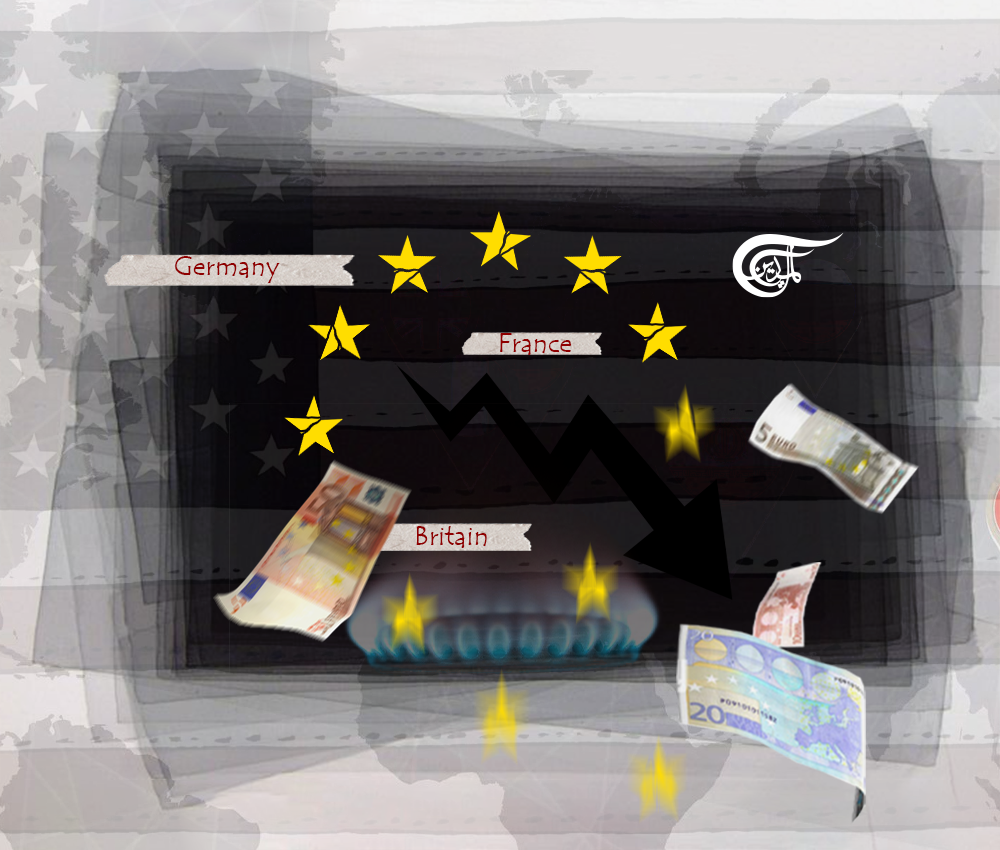The coming dawn of the post-European era
By means of an energy crisis and the overwhelming power of the dollar, the US is systematically cannibalising the European economy.
Seldom does history provide such ample warning of watershed events. In August of 1991, the Soviet Union appeared on the verge of fundamentally reforming itself when Communist Party hardliners launched a coup d’état, temporarily overthrowing President Mikhail Gorbachev. Within days the coup failed but it had unintentionally triggered a wave of secession by all Soviet member-states. Before the year was over, the USSR no longer existed.
Now, little over three decades since that transformative event, yet another geopolitical union and pillar of the global order, that centered on the European continent, is staring down the barrel of oblivion, this time with potentially years of advanced notice.
Dollar Hegemony will sink even US 'allies'
In an especially bitter irony, the United Kingdom had just welcomed its newest Prime minister and laid to rest its longest-ever reigning monarch, when on September 23, in response to a minibudget conjured out of a neo-Thatcherite fever dream, the pound promptly collapsed to its lowest level ever against the US dollar.
The financial markets, seeing the ideologues in the British government's plans to pay for lavish tax cuts for the rich with still higher levels of borrowing, sent interest rates briefly to levels last seen nearly 50 years ago. Evidently, even the financial classes, for whose benefit 'Thatcherism' was imposed, no longer believe in the doctrine of 'trickle-down economics.' In response to a crash that rendered the pensions industry in danger of collapse, the Bank of England stepped in to prop up the value of government-issued debts. This emergency half-measure ends this week, bringing back the specter of a generalized financial collapse that could easily spread beyond Britain.
The fact that Britain's new leaders are incapable of adapting their ideology to the real world is seeing global capital, for so long at home in London, fleeing for safer economic harbors. In the current climate, the only real safe harbor for capital is the US economy. By raising interest rates, as the Federal Reserve has committed to doing for the foreseeable future, Americans are exporting inflation to the rest of the world. As interest rates on dollar-denominated debts skyrocket, other currencies from the pound, the Turkish lira, and even the Euro itself are collapsing in value, making the import of dollar-denominated commodities ever more economically ruinous.
A self-inflicted de-industrialization
While Britain flirts with catastrophe driven by pure economic illiteracy, the European continent is facing an even more dire situation. As Brussels chose to go along with Washington's declaration of economic war against Russia over the war in Ukraine, Europe has at a stroke been disconnected from the plentiful, cheap energy sources that have kept German, French, Italian and Austrian industries competitive and profitable. Without them, whether the continent turns to exorbitantly priced liquified natural gas from North America or the Persian Gulf, the European economic model has been shattered. All that remains is to watch and see where the pieces land.
Months out from the winter, European petrochemical, metallurgical and industrial firms are already shutting down entirely or moving their operations to the United States where energy costs (including renewables) are far more enticing.
With EU member-states already bickering over the mechanisms to avert an energy-related industrial depression, the chances of interstate cooperation when the crisis really hits have gotten as good as they're going to. Even if the continent limps through the coming winter, it will simply face the same crisis again next year, and likely for the rest of the decade, in even worse shape than before.
However it comes about, whether Italy finally defaults on its mountain of debt, if France opts for a neofascist government that campaigns for a "Frexit" or Germany, but virtue of its collapsing industries reverts to maintaining economic strength through the conquest of its neighbors, the end of the European Union is now a foregone conclusion.
America alone
Whether the process of EU collapse happens over the next year or the rest of the 2020s, its disappearance, like that of the USSR, will leave the United States as the lone remaining pillar of the current global system. The level of US power may seem even more overwhelming than it did after the Cold War. In all likelihood, Washington will again, drunk on its own misplaced self-belief, attempt to refashion the global system in its image. However, it will soon find it is not alone on the world stage. As has been shown by the tectonic shifts driven by the war in Ukraine and economic campaigns of maximum pressure against Russia, Iran, and others, the ranks of nations searching for an alternative, post-western system of global economic exchange are growing. The more nations that join in this nascent project, the sooner this new world will become reality.
On September 2, Russia indefinitely shut down its main natural gas pipeline to Europe, the Nordstream 1 pipeline, having previously resumed exports at 20 percent capacity after "maintenance."
This is, of course, retaliation for the EU's commitment to the US-led economic war launched on Moscow at the outset of the war in Ukraine in February.
Eight months after embarking on this campaign, Europe is only now terrifyingly awake to the folly of thinking that severing its decades-long energy links with Moscow will harm Russia more deeply than it will the EU itself.
Even more worrisome is that one of the member states most acutely dependent on cheap Russian energy imports is also the economic and political engine of the European integration project, Germany.
Previously, Germany imported around half of its natural gas from Russia, which in turn feeds around a third of its sprawling petrochemical industrial base as well as electricity for domestic heating. While European heads of government have recently crowed that natural gas storage is near full capacity months ahead of schedule, this stored capacity would only satisfy 25 to 30 percent of normal winter demand. Now that Moscow has permanently switched off the taps, the prospect of critical shortages once the weather turns is looking all but inevitable.
With the weather now turning, Berlin will have to make a choice between heating households and propping up its industrial system, thereby preventing mass unemployment.
Across the continent, many heavy industries are already making the decision for their governments, with companies either shifting their operations to North America, where energy costs are orders of magnitude lower or ending their operations altogether. Even Deutsche Welle, the German public broadcaster, this week tentatively began discussing the possibility of a generalized "de-industrialization" of Europe.
Even largely nuclear-powered France is resigning itself to a winter of rolling blackouts, which may even occur there before they do in Germany, as half the country's nuclear facilities are out of operation due to maintenance and record-low hydro capacity due to drought.

 Samuel Geddes
Samuel Geddes
 7 Min Read
7 Min Read












